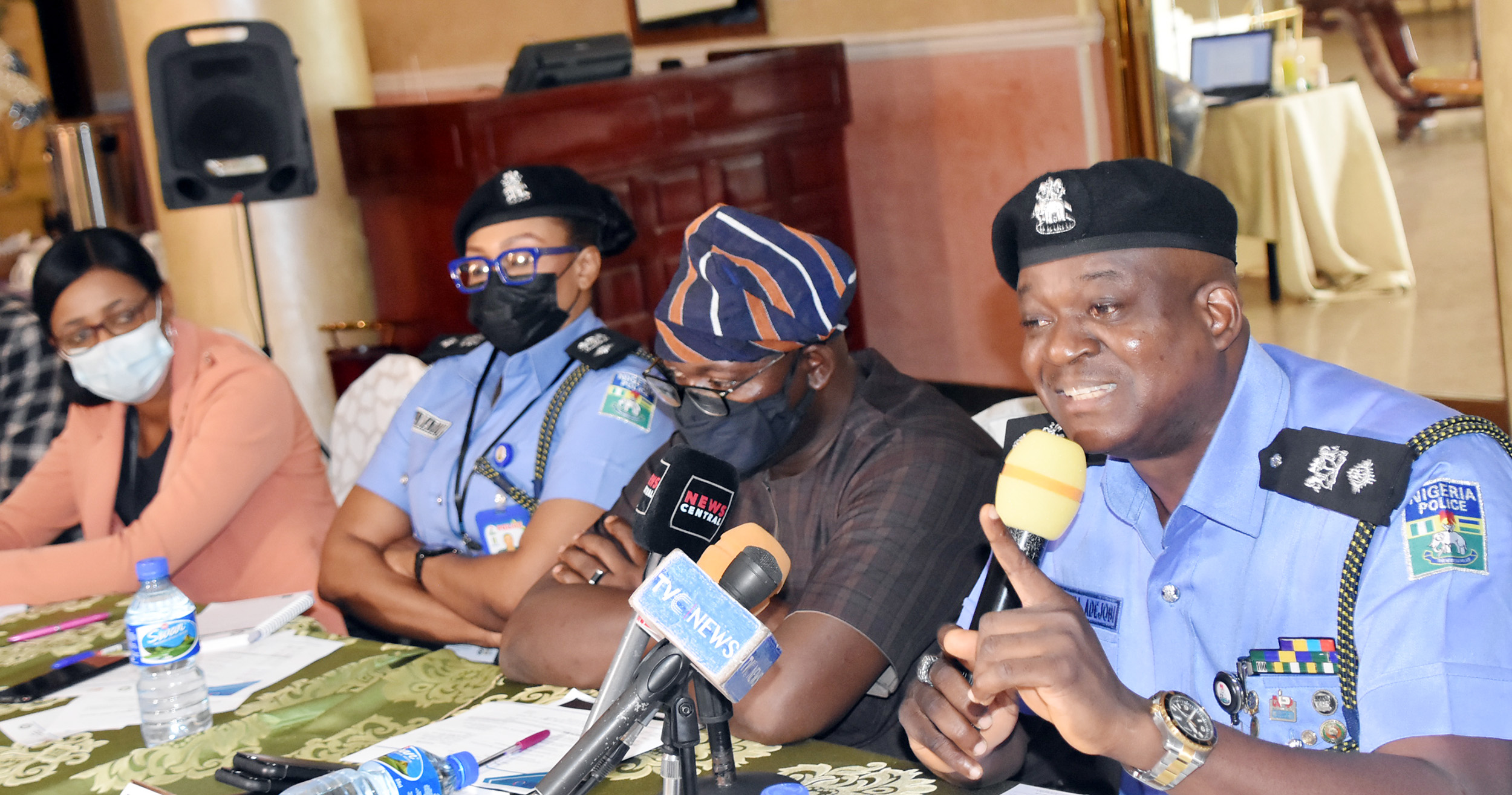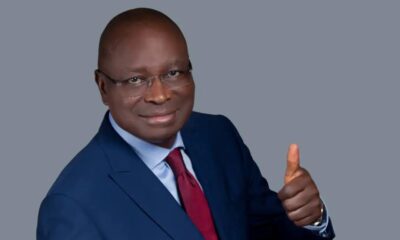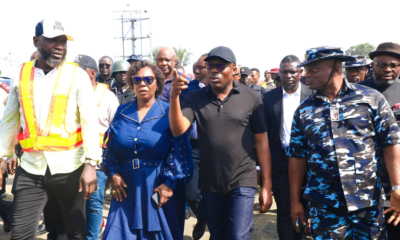News
Insecurity: We Can’t Run Away From Community Policing, Fayemi Admits

The Chairman of Nigerian Governors’ Forum (NGF) and Governor of Ekiti State, Dr Kayode Fayemi, has said community policing was the way to go but collaboration with the mainstream security agencies was needed to achieve results like western nations.
According to him, vigilante associations like Amotekun were achieving results with local intelligence with proofs to show in his state, Ekiti, adding that it is important to underscore a holistic approach to insecurity, because sitting at the centre of it, was bad government.
Fayemi said this, yesterday, during a panel discussion on overview of security situation across the states at the opening of a two-day multi-stakeholders meeting on the peace and inclusive security initiative organised by the NGF in partnership with the Centre for Democracy and Development (CDD).
He said: “We believe until and unless we begin to look at multi-level policing. That is what is happening in every nation around the world, we will not meet the demands of our people for local security and global protection. And ultimately, until we ensure that we address not just the conflicts and crime, but the causes of these conflicts. And we know some of them, out of school children, poverty in our communities, desperation, amongst the young people in the communities and generally good governance, improving the quality of governance. We may not be totally able to avoid what we are going through. Even when you have all that you will still have crime. But if you don’t have it at all, then it becomes even more problematic for you.”
Fayemi, who disagreed with the argument of a participant that state police would be prone to abuse, said abuses meted on some Nigerians by some security personnel is a proof that both federal or state police would still be prone to abuse.
According to him, as a sitting governor in 2014, he was abused by the police despite his immunity.
He said rather than condemn community policing, an institutional framework should be put in place to guard against abuse.
Fayemi explained “on local authorities who may not subscribe to institutionality rules. This is a perennial excuse that we get. I’m not going to sit here and make an excuse that such powers in the hands of some local actors may not be abused.
“Federal police that we all know abuse the rights of citizens, including the rights of governors, even with immunity, you may not know that. I was abused by federal police in 2014 during my election and I had immunity. Anybody could abuse.
“It could happen, even if you devolve security to the local level. However, what we need to be talking about is, what institutional frameworks should we put in place to ensure that such powers are not abused, not to use it as an excuse not to do the right thing.
“Because at the end of the day, there are mechanisms in our constitution to protect citizens’ rights.”
Fayemi noted that the police, despite having statutory body, the National Police Council recognised by the Constitution, unlike the National Judicial Council, was not effective in meting out punishments etc.
According to him, the National Police Council presided over by the president as chairman, and 36 governors as members, among others,was more or less a rubber stamp in doing the bidding of the executive.
Fayemi said: “Unfortunately, unlike the National Judicial Council, that is very effective in meting out punishments, sanctions, promotions, appointments for judicial officers across the length and breadth of the country.
“The National Police Council has only succeeded since the 1999 Constitution to ratify the appointment of Inspector General of Police. We are only summoned to National Police Council.
“And this is a constitutional body; by the way, check your Constitution you will find it there. It only meets when a new or acting Inspector General of Police is to be confirmed and ratified.
“That meeting is summoned and it meets for 10 or 30minutes. And then we look at the CV of the acting IG, and we approve. You’re not likely to disapprove anyway; the president has already appointed him. But that body has no powers beyond that,” he added.
The Ekiti governor further explained that in most countries where you have multi-level policing, there was a regulatory authority that was responsible for punishment and sanctioning those who go beyond their responsibilities.
“And I think that’s what we should be talking about. Rather than talking about the possibility of abuse, there would always be the possibility of abuse.
“We can’t run away from that. But do we have effective policing now that is federal? And there is no suggestion and that is why I didn’t use the term my brother (a participant) accused me of using, I said multi-level policing. I didn’t say state police, which means local police, state police, federal police, because arguing for multi-level policing does not suggest that we want federal police to go because there are federal crimes.
“There are also crimes that are within the borders of our states in accordance with the statute that’s been promulgated or enacted by our local state assemblies.
“And there are also crimes that are local because they are local jurisdictions by local governments. If you have not paid tenement rate, the local police should deal with you. It shouldn’t be state police, because the tenement rate is the responsibility of the local authority. Not the responsibility of the state. So, that’s my take on that,” he started.
On what states use security votes for, he said “Some states have something called security votes. It is not all states. Security votes have a history. And I will urge you to look for a book by Chief Jerome Ugoji. Serving three masters, that’s what the book is called. And you will find in that book: The origins of security votes in Nigeria.
“You say what do we do with it? Without mincing words, I can’t speak for others. But I also get feedback from other states in my capacity as chairman of the governor’s forum. There are hardly any of these institutions that you are talking about that we don’t fund. We found the police. We found the police more than the federal government, quote me.”
He added “we buy them vehicles. We pay them allowances. In some cases, we even buy ammunition, of course under the authority. And if we are to engage our military in aid to civil authority, which you will find, actually in 36 states in this country today, the military is involved in internal security operations, which is a problem because, for me, its role inflation.
“Now, when you inflate the role of the security institution beyond its primary responsibility, you also have consequences that will come with that that may not be palatable. But that’s where we are because most Nigerians don’t trust the police.
“They will still come and beg governor, governor, please, can you ask the brigade commander to put a roadblock in my area. And these are ordinary citizens insisting that we should put… and you can’t put military roadblocks everywhere. It’s not possible how many do we even have.”
Hinting on the cost of military operations in most states, he said, “But if you engage the military, in civil authority in your state, is only responsible of you to pay for the rations of the men that are engaged in that activity and not expect to have the military also share that burden because that’s not their primary responsibility.
“You’ve taken them out of their primary responsibility; you have to pay for it. So, we pay for that, we pay for civil defense, there is no security institution that you have that states are not responsible for more than the federal government that has primary responsibility for them.”
On why the governors were reluctant to allow local government autonomy to ensure that they play a role in security, he said, “You know, I just talked about multi-level policing. I have no objection to local authority playing a role in local security.
“But the debate about local government autonomy is a different debate. You don’t want us to get into it here because I have my views.
“We have a position in the governors’ forum on it. And it does not suggest that local government autonomy is precisely the way people put it. The principle of federalism is very clear about federating unit.
“Local government, as a federating unit is a unique innovation in Nigeria, I don’t see it in any research work, in any book on federalism. Local government autonomy is the business of the state because the state is the federating unit.
“And most federating countries that you have today have dual federating system. You have the federal and you have the state.
“So, those who are clamouring for local government autonomy is a populist demand, is very exciting to talk about it.
“But I don’t think ultimately it serves the purpose that they want it to serve because we have capacity challenges at that level just as we have at the state level. But the result is what you matter.
“And the result is that you can have Security Council in the local authority. We have in my state, the local government has Security Council almost every month, and they get involved in our security operations. So, it is what they do, it is not the name they are called, that should matter.”
The Deputy Governor of Plateau State, Prof. SonniTyoden, who represented the governor, added that “the existence of vigilantes is an aspect of multi policing. But we have not been able to get the best out of the situation, because the vigilantes have not been really treated as part of the security structure we operate. And I think that’s what we need to do. The existence of these vigilante groups, are manifestations of the disenchantment with the existing security apparatus. And I think if we modelled the vigilantes properly, incorporate them into the security structure, I think we will get something better out of it.”
Political counsellor, British High Commission, Jonathan Bacon, said addressing these security issues was essential for achieving the Sustainable Development Goals (SDGs) and for achieving economic growth and development.
The Director General, CDD, Dr Jubril Ibrahim, noted that the country has not had it so bad in terms of insecurity.
He said: “Our country is at its most terrible level, currently. We have never had it so bad; lots of efforts, lots of ideas are being placed on the table. At our level at the CDD, we are engaged in research to discover what are the real dynamics of this insecurity at the level of the grassroots? What are the actors doing? What are the actors saying? And how are other Nigerians interpreting what is being said and what is being done? It’s because of that we feel partnership with the governor’s forum is extremely important in trying to forge a policy path that will lead us towards confronting in a more adequate manner, these insecurities we are facing.”
News
Let’s Fight To Save Rivers’ Soul Together

Rivers State Governor, Sir Siminalayi Fubara, has lamented that there is a fierce fight over the soul of the State to destroy it but noted that only the well-meaning persons who are standing firmly with him can wield the force of unity to save it.
Governor Fubara made the remark at the country home of Sir Celestine Omehia in Ubima community, Ikwerre Local Government Area of Rivers State on Saturday.
The Governor, accompanied by some elders of the State, was in Ubima to commiserate with Sir Omehia, who had just laid his late mother, Mrs Ezinne Cecilia Omehia, to rest after 95 years.
Governor Fubara said the visit was to demonstrate love and show support to Sir Omehia who, as a son, had satisfactorily performed the duty of giving his mother a befitting burial.
He said, “I have come here with a few of us; very respected elders of the State, to come and support you and say to you that ‘we sorrow with you’.
”The most important thing is to show our concern and love. Any human being that shows enmity to death, that person is not even normal.
”We also rejoice with you for a life lived well to fulfillment by Mama. We wish Mama safe journey. Let her stay well where she has gone.”
Governor Fubara told the elders of the need for every true lover of the State to synergise and be resolute in the fight to safeguard the soul of Rivers State.
The Governor decried the evil of politics of bitterness and the telling danger it has on the progress of the State, which according to him, should be discouraged as a bad political culture in contemporary times.
Governor Fubara said: “Anybody who claims to love this State should not be party to anything, directly or indirectly, that will bring us backwards. We will continue to support every course that will advance the interest of our dear Rivers State.
”And I am happy to say, and I’ve said it over and again, it doesn’t matter the number of people that are standing with me, I will stand on that side of truth.”
The Governor emphasised: “I will not, I repeat, I will not govern our dear State on my knees (bending). If that was the purpose, I will not do that. I will stand to govern our dear State and stand continually on the side of right.
”But politics of bitterness will not take us anywhere. So, I want to thank you that, at this stage, we have a few of you who understand that Rivers State belongs to everyone of us. We must, therefore, fight together to sustain the soul of this State,” he added.
Governor Fubara also spoke about the tanker inferno that has become a sad episode in the State with over 120 vehicles razed and about five lives lost, describing it as “great tragedy and very unfortunate.
”It is a very sad day in our dear State. Something happened in Eleme, along the route of Indorama Petrochemical and Fertiliser Company Limited. A tanker had an issue with a tipper, and there was an unfortunate situation that caused the State a very devastating loss.
”I went there this morning to see for myself what really happened, and I can tell you, I’ve not been happy since then. With all the dramas in our State, it is not even proper for us to add that to it.
”But it wasn’t our fault. It was just what impatience caused. The tanker driver, knowing the state of that road was not patient, and it resulted in that colossal loss. Over 120 vehicles were completely burnt and five lives were lost. It was very unfortunate.”
He commiserated with those who lost loved ones and others whose vehicles were burnt beyond repairs, and added that the State Government mourns and grieves with them.
In his speech, Sir Celestine Omehia, expressed appreciation, on behalf of his family, to Governor Fubara, his delegation and other friends, among whom, were those he described as matured elders, for the show of love.
He said his mother died at 95 years, which is 25 years of grace added to the 70 years as specified in the Bible, and assured that he will sustain her legacy because she was their role model.
Sir Omehia also said that he was well known as a man who takes decision and stands by it no matter the consequences.
He, therefore, declared: “I have taken a decision to be SIMplified. Where ever you go (Fubara), is where I will go. If you say tomorrow, you are no more interested in this position, I will also stop fighting for anything in Rivers State.
”But, God who gave you the opportunity will also give you all the wisdom, strength, power and everything that it takes to govern the people of Rivers State and beyond.”
He assured the Governor that almost the entire people of the State, including chiefs, elders, opinion leaders, women, youths, civil society groups and professionals across all spectrums of the State were praying and working assiduously for the success of his Administration.
Sir Omehia told the Governor that it is that support and prayers of the people that he needs to succeed, because, according to him, one with God, is with majority, and will always excel and succeed.
He, therefore, urged the Governor to continue in his strides to deliver good governance, peaceful and prosperous State to the present and future generations.
Highlights of the event were the offering of prayers by leaders of Ikwerre Supreme Council of Traditional Rulers for the Governor and his Administration as well as the symbolic presentation of gifts to Governor Fubara in appreciation of his peaceful disposition and quality leadership of the State.
Breaking News
Tanker Inferno: We’re Saddened By Extent Of Carnage -Fubara

Rivers State Governor, Sir Siminalayi Fubara, has described as very unfortunate the fire incident caused by a tanker conveying premium motor spirit (PMS), otherwise called petrol which burnt motorists and commuters beyond recognition and destroyed a good number of vehicles.
The incident occurred between Indorama Gate and Aleto Bridge on the popular and ever busy Eleme section of the East-West Road now undergoing major reconstruction by the Federal Government.
Governor Fubara expressed his sadness at the gory sights that he saw when he visited the scene of the incident, accompanied by the State Commissioner of Police, Olatunji Disu, and the State Commissioner for Energy and Natural Resources, Mr Uchechukwu Nwafor, on Saturday morning.
The Governor explained that he got a call from the Managing Director of Indorama Petrochemical and Fertiliser Company Limited in Eleme Local Government Area, informing him of the incident.
At the news of the incident, Governor Fubara stated that he immediate routed a call to the security agencies and instructed that they visit the scene to take charge of the security of the area to avoid escalation of the situation.
Governor Fubara said: “We are here to see for ourselves and get a first hand information of the incident of what happened yesterday night.
“About 7.30 – 8pm, we got information of the gravity of the incident. I was told that it was caused by a tanker vehicle that was conveying Premium Motor Spirit (PMS).
“In fact, I got the information through the MD of Indorama, and I immediately alerted the security agencies to make sure they take control of the security situation in the area.
“And from what we are seeing this morning, it was not a pleasant case. We recorded a huge number of vehicles being destroyed and lives lost.
Governor Fubara explained that he had already requested the relevant government agencies to provide him a detailed account of their findings to enable the State Government take appropriate decisions and actions to significantly remedy the situation and reduce the negative on the affected people.
“I have already asked the relevant agencies to give us a full brief so that we can come into the situation fully by seeing to how much we can support the families that are bereaved, and also cushion the effect of the loses, which I believe, is no fault of a good number of them.
“We all know the situation of this road. It is really unfortunate. Most of our people, when plying this road, should ply it with caution.
“I believe very strongly that this situation would have been avoidable, if the motorists had behaved properly. But it is late already. The damage has happened. This is the situation we have found ourselves. We will see how we can control the aftermath,” he added.
News
82nd Birthday: Odu Eulogises King Dandeson Jaja

Rivers State Deputy Governor Prof. Ngozi Nma Odu, has described King Dandeson Douglas Jaja as a great and humble King who has continued to be a light to the Kingdom of Opobo and Rivers State.
Prof Odu stated this during a thanksgiving service to mark the monarch’s 82nd birthday at St. Paul’s Anglican Church in Opobo Town, yesterday.
According to the Deputy Governor, on a special day like this, she wishes him God’s grace and innumerable blessings, stressing that his reign shall be long in good health.
In his testimony, King Dandeson Douglas Jaja, who disclosed that he is nothing without God, said his life has been God’s Gift and Grace all these years, stressing that it is the Grace of God that has brought him this far.
The king seized the moment to announce the conferment of the King Jaja Manila Tree Award, which is the highest honour in Opobo Kingdom to the State Chief Executive, Sir Siminalayi Fubara and the BALOLO of Opobo Award to Prof. Ngozi Nma Odu, the Deputy Governor on a date to be announced later.
In his Sermon, drawn from Psalm 122: 6,7,8, Ven. Emanuel Nwuju, the Vicar of St. Paul’s Anglican Church, Opobo Town, who spoke on the theme “Good Gifts Comes from God “said God has given us everything we enjoy in life, adding that whatever you are today is a gift from God.
-

 News3 days ago
News3 days ago82nd Birthday: Odu Eulogises King Dandeson Jaja
-

 Politics3 days ago
Politics3 days agoJonathan Mourns, Ex-Senate Spokesperson, Ayogu Eze
-

 Rivers3 days ago
Rivers3 days agoFour Dead, 70 Vehicles Burnt In Fuel Tanker Explosion In Rivers
-

 Education3 days ago
Education3 days agoDon Seeks 20%Increased Budget Allocation To Education
-

 Business3 days ago
Business3 days agoAXA Mansard Backs Female-Owned MSMEs With N1.4m Grant
-

 Editorial3 days ago
Editorial3 days agoTowards Minimum Wage Implementation
-

 Nation3 days ago
Nation3 days agoSDP National Chairman Lauds FG’s Efforts To Tackle Insecurity
-

 Breaking News3 days ago
Breaking News3 days agoTanker Inferno: We’re Saddened By Extent Of Carnage -Fubara

